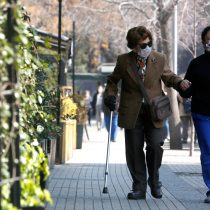
For many years, caregivers have been playing a key role with older adults and people with disabilities who need help doing many of their day-to-day activities. When the pandemic and subsequent confinement began in the country, caregivers and caregivers took a key role in preventing contagion to those in their care, also fearing transporting the virus home, making the process a major psychological and emotional burden.
The 2015 National Disability Study II showed a large gender gap among caregivers, released that 80.7% of those in the care of dependent adults are women, increasing this percentage for people with severe dependencies.
Something similar happens with the figures given by the Digital Hospital of the Ministry of Health, where they realize that more than 85% of older caregivers are also women. In addition, he realizes that 2 out of 3 caregivers have not taken vacations in recent years, in addition to caring for people in prolonged times, which can be extended for more than 12 hours. They don’t share care and unfortunately feel lonely.
On the other hand, the Senama-led National Dependency Survey in 2009 showed that 44% of caregivers surveyed have a depressive condition, while they had 19% light overload and 25% severe overload.
In this sense, we have seen that all their work is difficult, causing physical, psychological, social and economic effects, presenting physical exhaustion, increased frequency of depressive symptoms, permanence of negative emotions, decrease in the participation of social, family and, in some cases, low economic income activities.
So how do we support caregivers, especially these caring women?
Urgent public policies are required to recognize the valuable experience and great responsibility of this role and to be protected, with programs that support their psychological, emotional containment, to provide them with spaces to provide them with mechanisms and tools for their “self-care”, as they can avoid situations of high stress, both for them and for the person in their care. Along with this, ensure its socio-economic situation, as it should be a paid role on the part of the State.
Therefore, within the framework of November 5, “International Day of Caregivers”, it is important to make this reality visible and to encourage and thank all the caregivers of our country, who do a great job of containment, assistance, support and responsibility with people who need them day by day, a demanding and silent work.
We also call on the importance of providing support networks to these people, who often sacrifice and postpone their lives in order to serve others, which is completely an act of unconditional love and empathy.
"El reclamo puede ser genuino, pero construido sobre una mentira", apuntó el presidente Javier Milei…
El gobernador de la provincia de Buenos Aires, Axel Kicillof, encabezó un acto en Ensenada…
El diputado nacional de La Libertad Avanza, José Luis Espert, expresó su confianza en la…
Tras la masiva reaparición de Cristina Fernández de Kirchner, el presidente Javier Milei apuntó contra…
El principal propósito de la nueva comisión es evaluar los recursos humanos en el Senado,…
En una medida que busca redefinir las condiciones de los seguros de automóviles en Argentina,…
Esta web usa cookies.